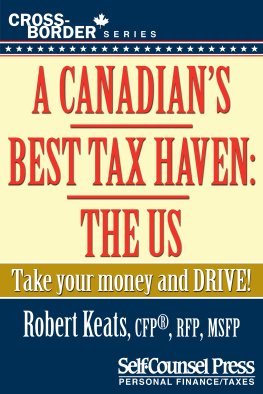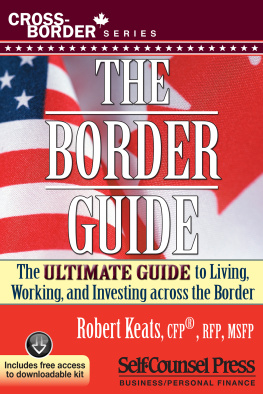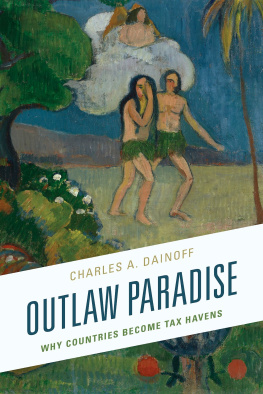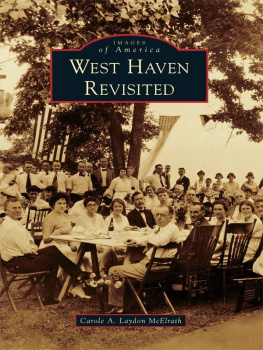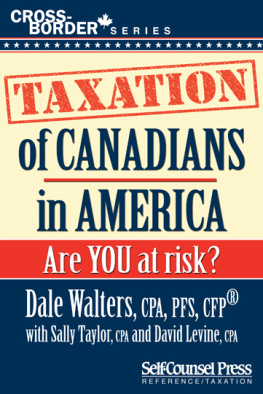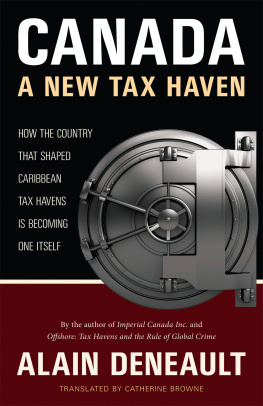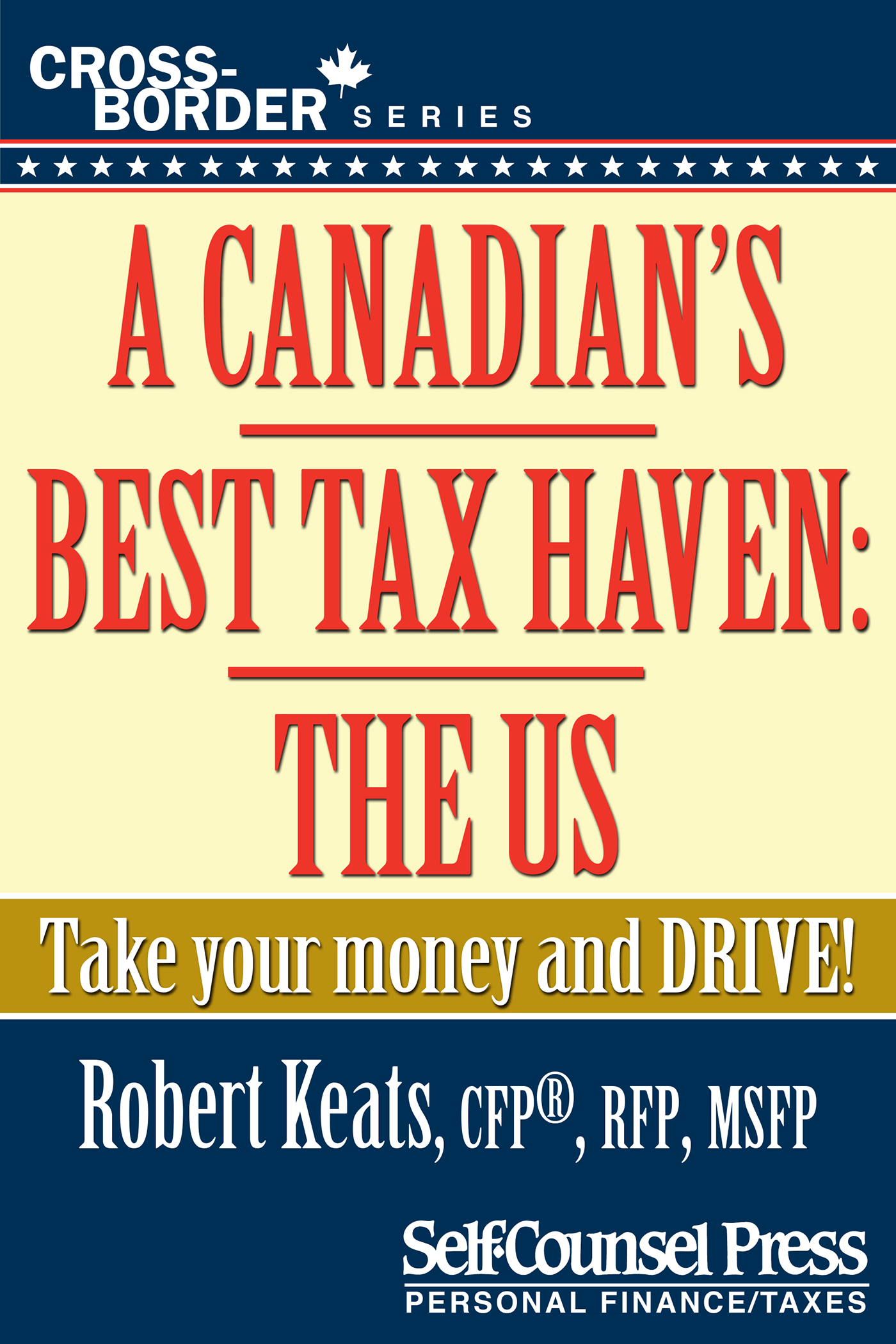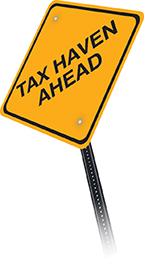Introduction
After writing ten editions of The Border Guide: A Guide to Living, Working, and Investing across the Border, a Canadian bestseller, and with about 1,000 Canadian baby boomers retiring each day, I felt the time was right for a simpler, more direct decision-making tool to assist Canadians in making the right choice when moving to a warmer climate in search of lower taxes.
This book will help you determine if the lifestyle choice of moving to a tropical climate with year-round golfing and sandy beaches is not only possible but whether it could also save you money, in the form of a lower cost of living and lower income taxes. This reduction in living expenses and taxes can allow you the ability to enjoy a lifestyle that most people have never dreamed possible.
The inspiration for this book came to me a few years ago when I was asked to speak to a group of Canadians in Dublin, Ireland. These Canadians were looking for the golden ticket a tax haven which would allow them to more efficiently use their lifetime of savings to maintain that desired tropical lifestyle, without having to pay nearly half of their income to the government in the form of income taxes. At this conference, there were multiple lectures and seminars from major financial institutions from many of the major tax havens of the world, pontificating the benefits of moving to their jurisdictions.
Most of the attendees of this conference had read the book Take Your Money and Run! by Alex Doulis. He did an excellent job writing his book, and it was an interesting read that allowed readers to dream of living on a yacht or some tropical island free from any government-tax authority. He made it sound very romantic and exciting, but the bottom line is that it is totally impractical for most Canadians and would not likely result in any net cost of living and income tax reductions.
Who would want to live on a yacht bobbing up and down from port to port with nowhere to ever call home, all the while looking over his or her shoulder to make sure the tax man is not bearing down on him or her? It may be fine for a few people or for a little while; however, yachting is very difficult and expensive, not to mention confining, sometimes nauseating, and potentially dangerous. Similarly, trying to find that ideal tax haven island in the middle of nowhere is not very practical for most people for the multiple reasons I will outline in this book.
My 35 years of experience advising Canadians in international tax and financial planning matters told me that the desired tropical lifestyle and reduction in living expenses is available to most Canadians, literally right beneath their noses in the form of the United States of America. Im also of the firm belief that you should Give to Caesar what is Caesars (Mark 12:17) and that thumbing your nose at the Canada Revenue Agency (CRA), although sometimes tempting, does no one any good. Keeping the CRA on your side by following its negotiated treaty rules actually gives you greater freedom in your lifestyle choice and greater protection from an adversarial relationship that could cause you a lot of aggravation.
As you will see in this book, I am quite fed up and disheartened with a small contingent of Canadian advisors who have very little knowledge about US tax and financial planning rules but preach to clients as if they were experts. They clearly do not understand how the US can be used to assist Canadians in achieving their desired cross-border lifestyle and reducing taxes. In my opinion, these advisors take advantage of a trusted relationship with their clients. They continually perpetuate myths and provide the wrong advice about the US due to ignorance, personal bias, or just plain laziness to take time to get educated properly.
I make no apologies to those in the Canadian advisory industry who ignore the US when advising Canadians to take their money and go to the proverbial tax haven island in the middle of nowhere in an attempt to kiss the CRA goodbye. However, if they are sincerely interested in doing what is in the best interest of their clients, I encourage these advisors to read this book. By reading this book, they may change their perspectives and help clients make the right choice as to which option is more appropriate for them: the US, or the traditional tax haven island.
This book will show Canadians a practical path to that desired tropical lifestyle in a low-tax jurisdiction with full, protected access to Canada to invest, own a business, and visit family and friends without having to live on a rocky boat or an island in the middle of nowhere.
As with my authorship of The Border Guide, in order to prevent this book from becoming a dry technical manual that is factually accurate but functionally useless, I have presented my ideas in a non-technical fashion. Certain concepts have occasionally been simplified in the service of readability. Sound professional advice is unquestionably recommended for the application of any of the ideas, suggestions, or techniques detailed in A Canadians Best Tax Haven: The US.
Chapter 1
What Is a Tax Haven?
The words tax haven are indeed mysterious and sometimes misleading, and have oftentimes been used and abused to depict mystical and elusive dreams. What does it mean to go to a tax haven? Is it some sort of fortress, a beautiful island, or, perhaps, a nursing home?
There are many definitions for tax haven. There is a strict technical definition and then there is a simpler and easier to understand laypersons definition. I will describe both in this chapter, so you have a better insight into the world of tax havens. I will describe how you can cut through the mystery and get to the bottom line to see how you can benefit from the legal use of a tax haven, in particular the best tax haven for Canadians: the United States.
For Canadians, deciding to use a tax haven can be as simple as taking their money, packing their bags, and voting with their feet to depart Canada. In other words, Canadian citizens have no obligation to physically live in Canada to maintain their Canadian citizenship. When they leave Canada, they are no longer formal Canadian residents, and they are no longer subject to Canadian income taxes on their worldwide income. However, making that leap from Canadian residency to that of the tax haven can be a critical lifestyle choice, which warrants a great deal of research and planning before making that final move.
1. The Traditional Tax Haven
The traditional tax haven is defined as a country with the following characteristics:
No or very minimal income tax.
Bank secrecy to the extent the laws of the country will not allow the exchange of tax information or banking information with foreign authorities.
Generally no tax treaty with any other country.
Relative ease for a foreign person to establish residency with few immigration hurdles.
No requirement for the resident to spend a minimum amount of time in that country, and the resident does not have to become a citizen.
A stable government and political system backed by a significant police force and/or military.
2. The Real Tax Haven Definition

